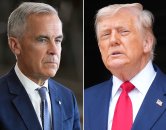Weekly Quiz: Poilievre’s By-Election Bet, Ford’s Power Ploy, and Blanchet on the Back Foot

1
2
const title = "Poilievre’s By-Election Bet, Ford’s Power Ploy, and Blanchet on the Back Foot"; const date = "July 12, 2025"; const data = [ { image: "https://walrus-assets.s3.amazonaws.com/img/WAL_Web-BattleRiver_JUN25_005-1536x1024.jpg", title: "Poilievre Is Parachuting into Rural Alberta to Win Back His Seat", url: "https://thewalrus.ca/poilievre-is-parachuting-into-rural-alberta-to-win-back-his-seat/", question: "After losing his seat in the federal election, Pierre Poilievre is now seeking redemption in one of Canada’s most conservative ridings: rural Alberta’s Battle River—Crowfoot. It’s a safe bet for Poilievre, especially since the Conservative Party has yet to receive less than what percentage of votes there?", options: [ "65 percent", "75 percent", "80 percent", "90 percent", ], answer: "80 percent", correct: "Since the Conservative Party’s creation in 2003, it has never received less than 80 percent of the vote in Battle River—Crowfoot (or in its predecessor riding, Crowfoot) except once, in 2021, though Damien Kurek still rolled to victory with more than 70 percent of the vote. But while Poilievre is largely expected to coast to victory in the by-election, planting a federal leader into one of Canada’s most conservative ridings in the midst of a surge in Alberta separatism may not be so simple for the long term.", incorrect: "Since the Conservative Party’s creation in 2003, it has never received less than 80 percent of the vote in Battle River—Crowfoot (or in its predecessor riding, Crowfoot) except once, in 2021, though Damien Kurek still rolled to victory with more than 70 percent of the vote. But while Poilievre is largely expected to coast to victory in the by-election, planting a federal leader into one of Canada’s most conservative ridings in the midst of a surge in Alberta separatism may not be so simple for the long term.", }, { title: "As Trump Revives Tariff Threats, Ford’s Electricity Threat Loses Voltage", url: "https://thewalrus.ca/ontario-energy-tariffs/", question: "With Canada being the largest exporter of electricity to the US—and Quebec and Ontario supplying most of that demand—premiers François Legault and Doug Ford have toyed with the idea of using their grids as leverage in the ongoing trade war. According to journalist Kunal Chaudhary, what would be the most serious consequence of the government taking this approach?", options: [ "It would distract Ontario and Quebec from focusing on generating enough energy to meet increasing demand", "It would likely trigger a greater retaliatory action from US President Donald Trump", "It could risk destabilizing Canada’s trade relationships with other G7 nations", "It could result in a constitutional challenge from other Canadian provinces", ], answer: "It would distract Ontario and Quebec from focusing on generating enough energy to meet increasing demand", correct: "Several US states have come to depend on Quebec for a significant portion of their electricity consumption. The province has the kind of leverage that could do some real damage, even more so than Ontario. But using this leverage, Chaudhary writes, would distract from the most pressing challenge both provinces face: generating enough energy to meet an explosion of demand on the horizon. It would also mean punishing the residents of a handful of states that all voted against Trump, jeopardizing decades of successful and ongoing cross-border infrastructure development and significantly destabilizing the region’s energy market.", incorrect: "Several US states have come to depend on Quebec for a significant portion of their electricity consumption. The province has the kind of leverage that could do some real damage, even more so than Ontario. But using this leverage, Chaudhary writes, would distract from the most pressing challenge both provinces face: generating enough energy to meet an explosion of demand on the horizon. It would also mean punishing the residents of a handful of states that all voted against Trump, jeopardizing decades of successful and ongoing cross-border infrastructure development and significantly destabilizing the region’s energy market.", }, { image: "https://walrus-assets.s3.amazonaws.com/img/Drimonis_BlocQuebecois-1800-1536x1024.jpg", title: "The Bloc Wants to Break Up Canada—but Not Yet", url: "https://thewalrus.ca/the-bloc-wants-to-break-up-canada-but-not-yet/", question: "On April 28, the Bloc Québécois’ seat count took a significant hit in Canada’s federal election, as Quebecers gravitated toward the party they saw as best equipped to stand up to US President Donald Trump: Mark Carney’s Liberals. How did party leader Yves-François Blanchet respond?", options: [ "He accused the Liberal Party of fearmongering to gain votes", "He proposed a partisan truce with other federal leaders", "He rallied Quebecers to return to their separatist roots", "He blamed low voter turnout for the Bloc’s loss of seats", ], answer: "He proposed a partisan truce with other federal leaders", correct: "Blanchet has called for a “partisan truce” with other federal leaders, pledging to collaborate with the new Liberal minority government. “The federalist parties and us, who are indépendantiste, must be capable of working together in the face of a crisis,” he told the Montreal Gazette. Blanchet says he’s content to be a good partner if Canada, in turn, respects Quebecers’ interests, but the move irritated the provincial Parti Québécois, which has had close ties to the Bloc as both share the goal of independence. Worried the Bloc’s approach legitimizes a federal adversary, PQ leader Paul St-Pierre Plamondon urged Blanchet to return to his “separatist roots.”", incorrect: "Blanchet has called for a “partisan truce” with other federal leaders, pledging to collaborate with the new Liberal minority government. “The federalist parties and us, who are indépendantiste, must be capable of working together in the face of a crisis,” he told the Montreal Gazette. Blanchet says he’s content to be a good partner if Canada, in turn, respects Quebecers’ interests, but the move irritated the provincial Parti Québécois, which has had close ties to the Bloc as both share the goal of independence. Worried the Bloc’s approach legitimizes a federal adversary, PQ leader Paul St-Pierre Plamondon urged Blanchet to return to his “separatist roots.”", }, { title: "RCMP Uncovers Domestic Terror Plot with Military Links", url: "https://thewalrus.ca/rcmp-uncovers-domestic-terror-plot-with-military-links/", question: "On July 8, the Royal Canadian Mounted Police (RCMP) arrested four individuals accused of terrorism and other offences, all of whom had links to the military. Motivated by American-style, radical, anti-authority attitudes, the group had plans to violently overthrow the government. Where and how did they attempt to recruit new members?", options: [ "They recruited at survivalist courses", "They recruited at rallies and protests", "They recruited on Instagram", "They recruited from support groups for veterans", ], answer: "They recruited on Instagram", correct: "The group had an Instagram account they used to spread the word about their efforts and recruit new adherents, particularly those with previous weapons training. They had also built up a substantial armoury of firearms and ammunition. The RCMP had initially begun their investigation into the cell in spring 2023, but several months elapsed before the Mounties, supported by the Integrated National Security Enforcement Team, were able to search and seize a cache of armaments—this took place in January 2024. Another six months elapsed before arrests were made. For national security expert Wesley Wark, there is explaining to be done about this extended timeline.", incorrect: "The group had an Instagram account they used to spread the word about their efforts and recruit new adherents, particularly those with previous weapons training. They had also built up a substantial armoury of firearms and ammunition. The RCMP had initially begun their investigation into the cell in spring 2023, but several months elapsed before the Mounties, supported by the Integrated National Security Enforcement Team, were able to search and seize a cache of armaments—this took place in January 2024. Another six months elapsed before arrests were made. For national security expert Wesley Wark, there is explaining to be done about this extended timeline.", }, ];
The post Weekly Quiz: Poilievre’s By-Election Bet, Ford’s Power Ploy, and Blanchet on the Back Foot first appeared on The Walrus.


Comments
Be the first to comment